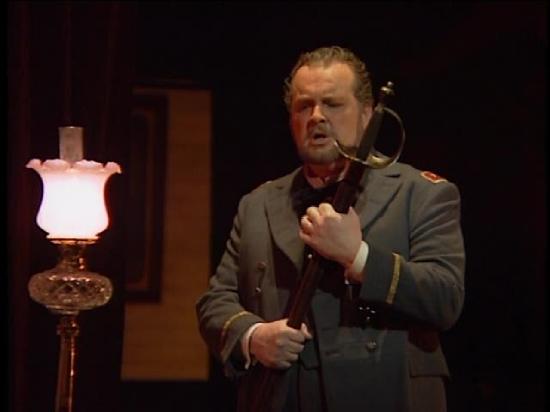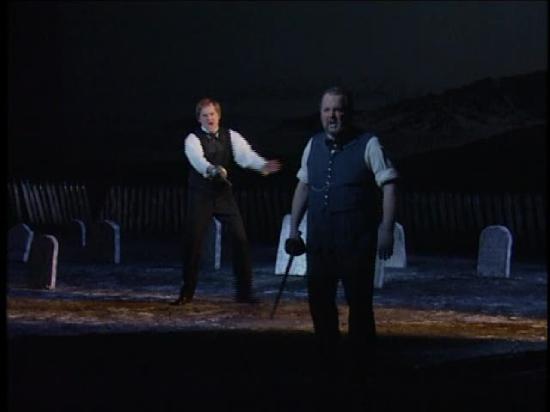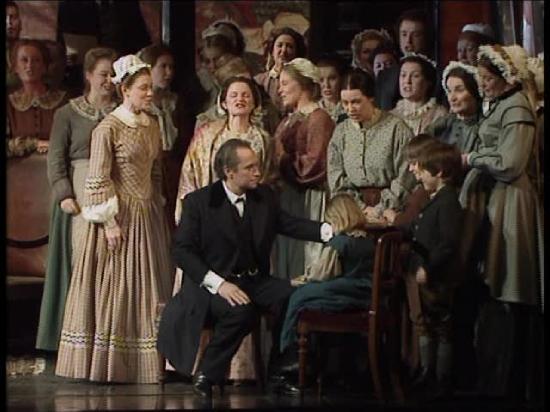Verdi: Stiffelio (Downes)
Introduction
Despite the amount of contemporary reports we have now, it's still very difficult to understand the power the arts had in the past, and especially the fear it could put into the establishment, not least the church.
Verdi was never one to deliberately kow tow to anyone in particular (apart from perhaps his publisher, Ricordi), and was a relatively free spirit when it came to subject matter for his operas. This particular topic involves the adulterous wife of a probably heretic Protestant cult leader, and his subsequent forgiveness of her 'sins', and so immediately got on the wrong side of the Catholic Church in Italy - as if that would come as a surprise to anyone. Rewrite after rewrite (the story was 'adapted' quite substantially in two subsequent operas) meant that it could never really be established in the same way as his next opera, Rigoletto, and so it disappeared from view after a while, only being properly revived in the latter part of the 20th century when a copy of the orchestral score was rediscovered.
Video
Very clear indeed considering the source is 15 years old. Actually, perhaps this isn't too surprising, although it's fair to warn that Opus Arte discs are NTSC, and so will not appear satisfactory unles you change your settings!
Extras
Yet again for one of the archive ROH releases, absolutely nothing, which is a great shame. I'm sure that this work is not particularly well known - you could tell this by the fact the audience didn't really know when to clap as they woud do automatically at the end of a 'famous' aria - and so something to help us understand the context of this piece in Verdi's output (even in the booklet) would have been helpful.
Conclusion
This is a bit of a curate's egg (pun intended), but is a very welcome release as it shows that a work such as this can be a powerful and emotionally gripping experience, musically at least. A couple of scenes stand out, most notably the opening of Act 2, in which the composer raises the stakes somewhat in musical invention, and the overture is rather good too, containing tunes which don't seem to be at all related to the rest of the work but is really quite fun, considering the mood of the plot.
Elijah Moshinky's production is straight down the line, leaving the story to develop without any nasty 'contemporary' interferences (although I can imagine a more modern take involving some US Bible-belt updating may well be quite relevant if done properly), and is only really spoiled by the 'stiff' (pun intended again) acting by many of the cast.
Brian Large's TV direction gets up close and personal, which is great for some of the shots in the pit during the overture (and I spotted a peculiar brass instrument which will be investigated further, if I remember to do so). Unfortunately, the close ups also tend to show up the limited facial expressions that generally run the gamut of emotions from A to B (thanks to Dorothy Parker) which would appear to be 'Angst', and 'Barely able to raise a laugh'.
Talking of which, Carreras and Malfitano themselves are not at all convincing on stage, unless you close your eyes and listen, when things actually begin to make sense (in which case you miss the subtitles of course, and so lose the plot a little). Every movement appears contrived and indeed 'posed', and you find yourself watching a tenor and soprano strutting their stuff without actually getting into character. Malfitano has got 'looking worried' down to a fine art, and Carreras feels he is obviously the star of the show.
Vocally, they are superb, but sometimes I would have preferred less Italianate gesturing and posturing from Carreras who seemed to make more effort showing he can make a nice sound rather than involving himself in the drama. His best moment is in the last few minutes during the redemption scene, and so perhaps we can forgive him ourselves.
Edward Downes does a fine job, pacing the music brilliantly, and allows the almost stereotypical Verdi soundscape to convince us that there is a lot to admire. Generally, the orchestra plays as well as we would expect from this band but there are one or two moments where perhaps the unfamiliarity of the score surprises them, especially in the violin ensemble.
Dominating the 'smaller' roles is Gregory Yurisich, who is the only on on stage who draws your attention in everything he does. Gwynne Howell (Jorg) is great to see, but his character is a fairly one-dimensional religious zealout, and Robin Leggate (Raffaele) is a rather ineffectual adulterer, but vocally is very fine indeed.
This is definitely something to explore if you don't know the work, but there is at least one other version on DVD around from the Met, and with Domingo in the title role the Opus Arte release may have a run for its money. Mind you, it has never done any harm to have two of anything.



Your Opinions and Comments
Be the first to post a comment!